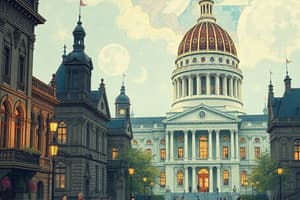Podcast
Questions and Answers
What is the primary reason colonists sought independence from Britain?
What is the primary reason colonists sought independence from Britain?
- Desire for a stronger military presence
- No taxes without representation (correct)
- Demand for more land acquisition
- Discontent with the trade regulations
How many total members are there in the House of Representatives?
How many total members are there in the House of Representatives?
- 435 (correct)
- 100
- 250
- 210
Which party did Theodore Roosevelt represent during his 1912 presidential run?
Which party did Theodore Roosevelt represent during his 1912 presidential run?
- Libertarian Party
- Republican Party
- Democratic Party
- Bull Moose / Progressive Party (correct)
What are the original 13 colonies?
What are the original 13 colonies?
What is the role of civic responsibility?
What is the role of civic responsibility?
Who fought in the French and Indian War?
Who fought in the French and Indian War?
How many Supreme Court justices serve in the U.S. Supreme Court?
How many Supreme Court justices serve in the U.S. Supreme Court?
What constitutes a civic duty?
What constitutes a civic duty?
What is a refugee?
What is a refugee?
Which amendment recognizes that the power of government is limited?
Which amendment recognizes that the power of government is limited?
What term describes powers that are specifically listed in the Constitution?
What term describes powers that are specifically listed in the Constitution?
Which of the following is a definition of slander?
Which of the following is a definition of slander?
What is the function of the Electoral College?
What is the function of the Electoral College?
What does the term 'popular sovereignty' refer to?
What does the term 'popular sovereignty' refer to?
Which power does Congress have that is not explicitly stated in the Constitution?
Which power does Congress have that is not explicitly stated in the Constitution?
What is a subpoena?
What is a subpoena?
Flashcards
Representative Democracy
Representative Democracy
A type of government where citizens elect representatives to make decisions on their behalf.
Bill of Rights
Bill of Rights
The 1st ten amendments to the US Constitution, guaranteeing basic rights and freedoms like freedom of speech, religion, and the press.
Eminent Domain
Eminent Domain
The power of the government to take private property for public use, with just compensation paid to the owner.
Separation of Powers
Separation of Powers
Signup and view all the flashcards
Suffrage
Suffrage
Signup and view all the flashcards
Naturalization
Naturalization
Signup and view all the flashcards
Double Jeopardy
Double Jeopardy
Signup and view all the flashcards
Federalism
Federalism
Signup and view all the flashcards
Refugee
Refugee
Signup and view all the flashcards
Expressed Powers
Expressed Powers
Signup and view all the flashcards
Implied Powers
Implied Powers
Signup and view all the flashcards
Ethnic Group
Ethnic Group
Signup and view all the flashcards
Amnesty
Amnesty
Signup and view all the flashcards
Pardon
Pardon
Signup and view all the flashcards
Tenure
Tenure
Signup and view all the flashcards
Study Notes
Government Functions
- Government passes and enforces laws
- Protects public health
- Manages the economy
Forms of Government
- Representative Democracy
U.S. Government
- Location of Ellis Island: New York
- Dred Scott: A slave who fought for freedom
Civic Duties and Responsibilities
- Civic Duty: Actions required by law (e.g., paying taxes)
- Civic Responsibility: Actions not legally required but encouraged (e.g., voting)
Wars and Independence
- French and Indian War: Fought between the British and French (with Native Americans)
- Reasons for Colonial Independence: No taxation without representation
Constitutional Amendments
- Number of amendments: 27
Political Parties
- Theodore Roosevelt's Party in 1912: Bull Moose/Progressive (Third Party)
- Senators per state: 2 per state
- Representatives in the House: 435
Congressional Committees
- Types of committees: Standing, Select, Joint
Presidential Succession
- Vice President
- Speaker of the House
- President pro tempore of the Senate
Executive Branch
- Executive Office departments: Office of Management and Budget (OMB), National Security Council (NSC), Council of Economic Advisers
Presidential Terms
- Number of terms a president can serve: 2 terms (10 years maximum)
Thirteen Original Colonies
- List of the original 13 colonies (New Hampshire, Massachusetts, Rhode Island, Connecticut, New York, New Jersey, Pennsylvania, Delaware, Maryland, Virginia, North Carolina, South Carolina, Georgia)
Mayflower Trip
- Year of the Mayflower voyage: 1620
- Reasons for colonial settlement: Religious freedom
Colonial Conflicts
- Fined amount for Rosa Parks: $10
Integration
- Escorted the Little Rock Nine to school: National Guard
Mayflower
- Death rate of Mayflower passengers: Half of them died of sickness during their first winter in the colonies
U.S. Citizenship
- Birth in U.S. = U.S. citizen: True
- Major cash crops in New England: Fur (hunting)
Voting Rights
- Vice President vote in Senate: No
- Citizenship loss: Possible
Legal Terms
- Immigrant: Person moving permanently to another country
- Refugee: Person leaving home due to war, famine, or natural disasters
- Tolerance: Respecting differences in beliefs and practices
- Ethnic group: Group sharing common national, cultural, or racial background
- Values: Guiding principles for decision-making
- Concurrent powers: Shared authorities of state and federal government
- Popular sovereignty: Government authority derived from people
- Separation of powers: Division of government power among branches
- Amendment: Change to the Constitution
- Electoral College: Group to elect president and vice president
- Second Amendment: Right to bear arms
- Tenth Amendment: Recognition of limited government power
- Twenty-sixth Amendment: Voting age 18 for federal elections
- Ninth Amendment: Unenumerated/unlisted rights exist beyond the constitution
- Slander: Spoken false statements causing harm
- Libel: Written false statements causing harm
- Segregation: Separation of races
- Bail: Security to ensure return for trial
- Poll tax: Tax preventing voting
- Impeachment: Accusation of misconduct in office
- Expressed powers: Powers listed explicitly in the constitution
- Implied powers: Powers not explicitly stated but implied
- Amnesty: Pardon to a group
- Pardon: Forgiveness and release from punishment
- Ambassador: Representative of a nation
- Embargo: Trade restrictions
- Subpoena: Court order for a person to appear in court
- Tenure: Right to hold an office after confirmation
- Nullify: Cancel legally
Studying That Suits You
Use AI to generate personalized quizzes and flashcards to suit your learning preferences.




